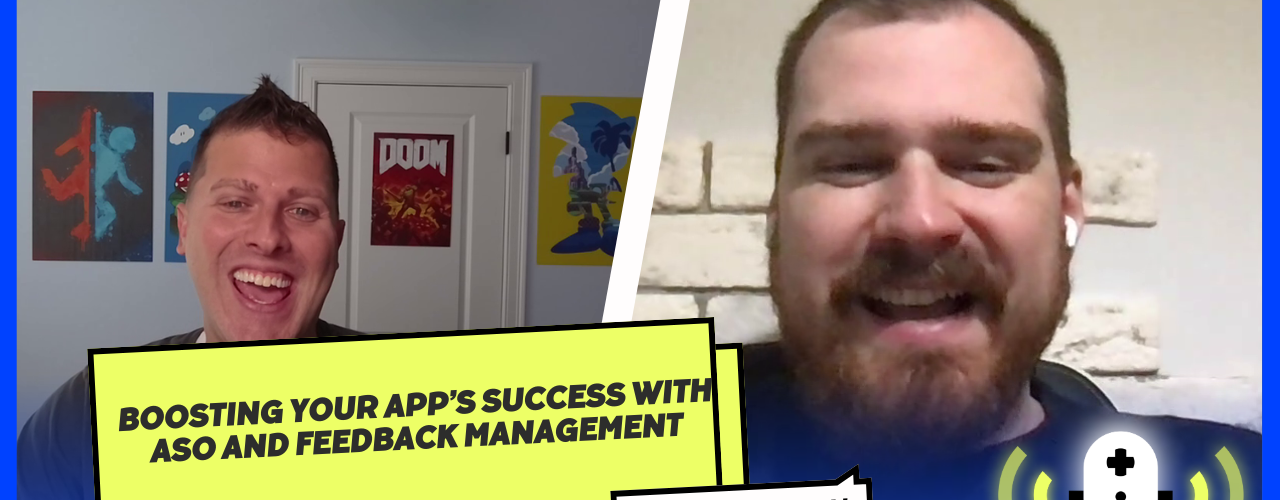In the latest episode of Player Engage, we dive into the world of App Store Optimization (ASO) and reputation management with Yaroslav Rudnitskiy, an ASO expert from AppFollow. Yaroslav shared insights on how ASO can drive organic downloads and why managing feedback is crucial for app success. Here are the key takeaways from our conversation:
View on Zencastr
1. Understanding ASO: Boosting Your App’s Visibility Yaroslav explains that App Store Optimization (ASO) is essentially SEO for apps. The goal of ASO is to increase organic downloads by improving search visibility and converting impressions into downloads. This is done through strategic keyword placement and optimizing app metadata, such as titles, subtitles, and descriptions on platforms like the App Store and Google Play. For those unfamiliar, think of ASO as the behind-the-scenes work that gets your app noticed.
2. The Difference Between App Store and Google Play While both platforms require ASO, Yaroslav highlighted the differences in how they operate. The App Store’s algorithm is simpler and easier to manipulate through keyword placement and downloads, while Google Play’s algorithm is more complex, factoring in retention rates and user engagement. For app developers, understanding these nuances is essential to maximize visibility and downloads.
3. The Impact of Regular Metadata Updates One of Yaroslav’s top recommendations is to update your app’s metadata every month and a half. Algorithms change frequently, and small adjustments can have a significant impact on your app’s ranking. Regular updates also ensure your app stays relevant, helping to maintain its position in search results and adapt to evolving market trends.
4. Reputation Management: The Key to User Engagement Managing feedback and maintaining a positive reputation is as important as ASO. Yaroslav emphasized the need to engage with users and address their concerns quickly. AppFollow provides tools that make managing reviews easier, from filtering feedback by priority to automating responses for repetitive tasks. Responding promptly to user reviews not only improves satisfaction but also builds trust in your app.
5. Using Competitor Analysis to Improve Your App Yaroslav advises developers to keep a close eye on their competitors. Analyzing what your competitors do well and where they fall short can provide valuable insights into how you can enhance your app. This approach allows you to refine your strategy and leverage opportunities that your competitors may have overlooked.
6. Localization: A Key Strategy for Global Success ASO isn’t just about keywords—it’s also about making sure your app is accessible and engaging in different markets. Localization involves adapting your app’s content to resonate with users in various regions, which can significantly boost organic downloads. Yaroslav pointed out that localization efforts should be prioritized based on performance data from soft launches to optimize ROI.
7. Integrating Feedback for Continuous Improvement Feedback is gold, and how you use it can set your app apart. Yaroslav shared how analyzing user reviews can reveal common pain points and areas for improvement. Whether it’s adapting features, fixing bugs, or adding new content, incorporating feedback into your development process ensures your app continues to meet user needs.
8. Success Story: Maitona’s Feedback Automation A standout example shared by Yaroslav was of Maitona, a game publisher that fully automated its review management process using AppFollow’s AI tools. This approach allowed them to respond to every review, increasing their engagement and improving user satisfaction. By automating simpler tasks, Maitona’s team could focus on addressing more complex user concerns, creating a seamless and responsive feedback loop.
Timestamps & Key Takeaways:
- [04:00] What is ASO and Why It Matters
Yaroslav breaks down App Store Optimization (ASO), comparing it to SEO for apps. He explains how ASO boosts organic downloads through strategic keyword placement and optimized metadata. - [11:45] App Store vs. Google Play: Key Differences
Yaroslav highlights the key differences between the App Store and Google Play algorithms, including how each platform evaluates app visibility and performance. - [19:30] The Importance of Regular Metadata Updates
Yaroslav emphasizes the need for frequent updates to your app’s metadata to keep up with changing algorithms and market trends, suggesting updates every 6 weeks. - [27:20] Managing Feedback and Reputation with AppFollow
Managing app reviews is crucial for building trust. Yaroslav discusses how AppFollow’s tools help developers manage user feedback, automate responses, and engage more effectively with their community. - [35:00] Leveraging Competitor Analysis to Enhance ASO
Yaroslav advises developers to analyze competitors to find opportunities for improvement. By understanding what others are doing well—or poorly—you can refine your own ASO strategy. - [42:10] Success Stories: Feedback Automation in Action
Yaroslav shares a success story from Maitona, a game publisher that used AppFollow’s automation tools to manage feedback efficiently, enhancing user satisfaction and retention.
Conclusion App Store Optimization and reputation management are powerful tools that can elevate your app’s performance. From boosting search visibility to engaging with your users, these strategies are essential for standing out in today’s competitive app landscape. As Yaroslav puts it, always be improving, always be engaging, and never underestimate the power of feedback.





